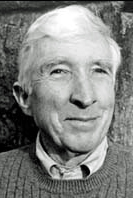"Brazil"
(Reviewed by Judi Clark FEB 3, 1998)
This novel is about a love affair between a white privileged girl and a black teen from the streets of Rio who meet on the beach. But this is far from a Romeo and Juliet love story. (Would Juliet have prostituted herself for Romeo?)
I liked this book when I read it, but most reviewers initially seemed to hate it. I don't know if it was because they didn't forgive Updike for trying out magical realism or if they don't like that genre of fiction to begin with. It certainly isn't the story itself since it reads like an adult fairy tale.
- Amazon readers'
rating:
 from
35 reviews
from
35 reviews
(back to top)
Bibliography: (with links to Amazon.com)
- The Poorhouse Fair (1959)
- The
Centaur (1963)

- Couples (1968)
- A Month of Sundays (1975)
- Marry Me: A Romance (1976)
- The Coup (1978)
- Roger's Version (1986)
- S (1988)
- Memories of the Ford Administration (1992)
- Brazil (1994)
- In the Beauty of the Lilies (1996)
- Toward
the End of Time (1997)

- Gertrude
and Claudius (2000)

- Seek My Face (November 2002)
- Villages (October 2004)
- Terrorist (June 2006)
Rabbit books:
- Rabbit, Run (1960)
- Rabbit Redux (1971)
- Rabbit
is Rich (1981)
 /
/ 
- Rabbit
at Rest (1991)

Bech novels:
- Bech: A Book (1970)
- Bech is Back (1982)
- Bech at Bay (1998)
Eastwick novels:
- The Witches of Eastwick (1984)
- The Widows of Eastwick (October 2008)
Short Stories and Collections:
- The Same Door: short stories(1959)
- Pigeon Feathers, and other stories (1962)
- Telephone Poles and Other Poems (1963)
- Olinger Stories (1964)
- Of the Farm (1965)
- Assorted Prose (1965)
- The Music School (1966)
- Midpoint, and other poems (1969)
- Museums and Women (1972)
- Six Poems (1973)
- Buchanan Dying: A Play (1974)
- Picked-Up Pieces (1975)
- Tossing and Turning (1977)
- Problems and Other Stories (1979)
- Hugging the Shore: Essays and Criticism (1983)
- Jester's Dozen (1984)
- Facing Nature: Poems (1985)
- Trust Me: Short Stories (1987)
- Golf Dreams (1988)
- Just Looking: Essays on Art (1989)
- Self-Conciousness (memoirs) (1989)
- Odd Jobs: Essays and Criticism (1991)
- Collected Poems: 1953-1993
- The Afterlife and Other Stores (1994)
- More Matter: Essays and Criticism (1999)
- Licks of Love: Short Stories (November 2000)
- Americana and Other Poems (May 2001)
- Still Looking: Essays on American Art (November 2005)
- Due Considerations: Essays and Criticism (October 2007)
- The Maple Stories (April 2009)
Related:
- The John Updike Encyclopedia by Jack DeBellis (2000)
E-Book Study Guide:
- Study Guide for RABBIT, RUN (July 2002)
Movies from books:
- Rabbit, Run (1970)
- Witches of Eastwick (1987)
(back to top)
Book Marks:
- Kirjasto on John Updike
- The New York Times® John Updike page
- Salon interview with John Updike
- The New York Times review (by Barbara Kingsolver) of Brazil
- MostlyFiction.com's review of Terrorist
- MostlyFiction.com review of The Widows of Eastwick
- New York Mag obituary for John Updike
- BBC's John Updike: Life in Pictures
- New York Times appraisal for John Updike
(back to top)
About the Author:
 John Updike was born in 1932, in Shillington, Pennsylvania, as an only child. His
father taught algebra in a local high school, and his mother wrote short stories and novels. After getting
straight A's in high school, he went to Harvard University on a full scholarship,
studying English and graduating summa cum laude in 1954. After graduation,
he spent a year in England, at the Ruskin School of Drawing and Fine Art
in Oxford. From 1955 to 1957 he was a member of the staff of The
New Yorker, to which he has contributed poems, fiction, essays, and
book reviews.
John Updike was born in 1932, in Shillington, Pennsylvania, as an only child. His
father taught algebra in a local high school, and his mother wrote short stories and novels. After getting
straight A's in high school, he went to Harvard University on a full scholarship,
studying English and graduating summa cum laude in 1954. After graduation,
he spent a year in England, at the Ruskin School of Drawing and Fine Art
in Oxford. From 1955 to 1957 he was a member of the staff of The
New Yorker, to which he has contributed poems, fiction, essays, and
book reviews.
He is the author of over fifty books, including collections of short stories, poems and criticism. His novels have won the Pulitzer Prize, the National Book Award, the American Book Award, the National Book Critics Circle Award, the Rosenthal Award, the Howells Medal and the Campion Medal. He essentially published a book or so a year.
In 1959 Updike published both his first book of short fiction, The Same Door, and his first novel, The Poorhouse Fair. That year he also moved from New York City to the coastal town of Ipswich, Massachusetts, where he lived most of the time since.
Updike won the National Book Award in 1963 for his novel The Centaur. He gained popular success with Couples, published in 1968, a tale of adultery among middle-class couples in a small New England town. He was most famous for his four "Rabbit" novels, which chronicled the adventures of one Harry “Rabbit” Angstrom; the last two novels Rabbit is Rich and Rabbit at Rest, each won a Pulitzer Prize for Fiction.
He was twice married and the father of four children.
John Updike died at the age of 76 on January 27, 2009 of lung cancer at a hospice near his home in Beverly Farms, Massachusetts.


